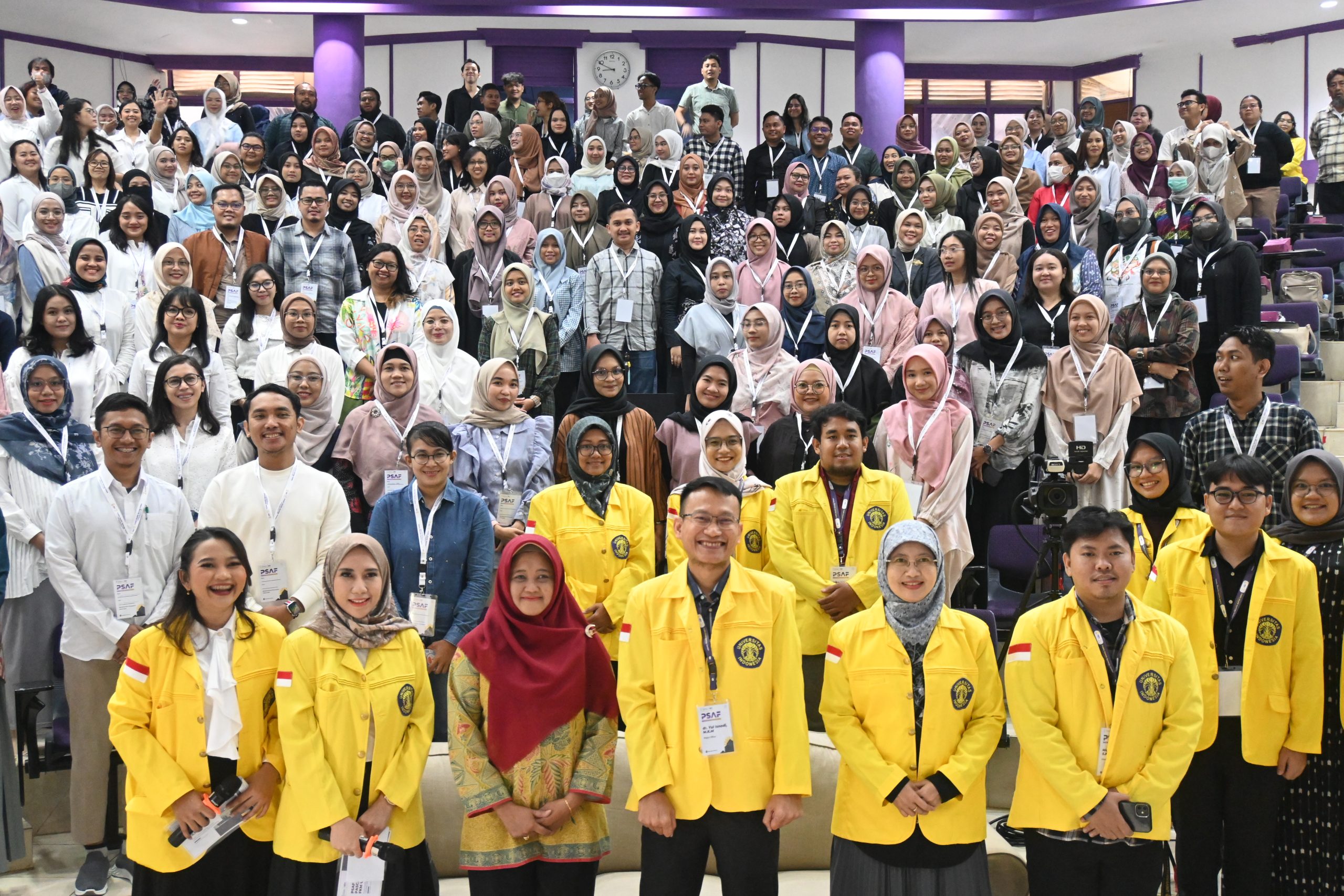On August 24-25, 2024, the Vice Dean for Education, Research, and Student Affairs of the Faculty of Public Health (FPH) Universitas Indonesia (UI), Dr. Ir. Asih Setiarini, M.Sc., delivered a speech to more than 300 new graduate students of FPH UI who participated in the Introduction to Campus Life for New Students (PKKMB), held in a hybrid format at the FPH UI Building A Auditorium and via Zoom Meeting. “Welcome, graduate students of 2024, and may you be motivated to achieve excellence on this campus. FPH UI continues to show outstanding achievements and consistently ranks number one in Indonesia, but we must not be complacent and must continue to strive to improve our accomplishments,” said Dr. Asih. She further encouraged students to not only focus on academics but also actively engage in organizations, strive for achievements, and attend various conferences so that research findings and prototypes do not just stay in the library but can be more widely beneficial.
This year’s theme for the PSAF Graduate Program was “Public Health Synergy Center: Learning, Leading, Leveraging.” PSAF is an essential series of activities to introduce new students to FPH UI, as well as to recruit active members for the FPH UI Student Association and initiate early-stage cadet training. PSAF also aims to provide new students with a comprehensive understanding of the academic system at FPH UI. New graduate students, both master’s and doctoral, were introduced to various important aspects, including the use of SSO, SIAK NG, EMAS2, and the various non-academic facilities available at FPH UI.
Curriculum-related materials were delivered by Dr. Ir. Asih Setiarini, M.Sc. According to the 2024 Academic Regulations of FPH UI, for the Master’s Program, students are required to complete a minimum of 54 credits within a period of 4 to 8 semesters. Meanwhile, the Doctoral Program, with a requirement to complete a minimum of 88 credits, must be completed within 6 to 12 semesters. The final project for students will take the form of a thesis, prototype, or project. “The results of the final project must be disseminated through seminars, publications in accredited national or international journals, or through patents,” Dr. Asih stated. During their studies, students will be guided by academic advisors, and the final project supervision will be structured, either in person at the UI campus or online, with a minimum of six sessions per semester.
Dr. Milla Herdayati, S.K.M., M.Si., during her presentation on the Integrity Zone (ZI) at FPH UI, emphasized the importance of institutional commitment to realizing a Corruption-Free Area (WBK) and Clean and Serving Bureaucratic Area (WBBM). The Integrity Zone is a designation given to government agencies, including universities, whose leadership and staff are committed to providing quality public services to achieve the organization’s vision and mission. “Although the corruption perception index in Indonesia has not improved, the spirit of reform must continue to be encouraged at FPH UI,” explained Dr. Milla. According to Dr. Milla, the implementation of ZI at universities is crucial as it not only guarantees the quality of education but also prepares a generation with integrity, enhances the institution’s reputation, strengthens governance, and supports responsible innovation and research. The values of integrity applied on campus are based on the nine values of UI. Students can participate by maintaining honesty, reporting deviations, actively participating in organizations, and becoming agents of change. For service complaints, the SIPDUGA UI and FPH E-Komplain platforms are available. Thus, the Integrity Zone serves as a foundation to ensure that FPH UI produces graduates who are not only competent but also have integrity and are ready to contribute to the nation, Dr. Milla added.
Prof. Dr. Besral, S.K.M., M.Sc., the Manager of UPMNA and a member of the Anti-Bribery Compliance Commission (KKAP) of FPH UI, explained the efforts to control gratuities on campus through the implementation of the Anti-Bribery Management System (SMAP) adopted from the international standard ISO 37001:2016. FPH UI successfully obtained the ISO SMAP certification in 2022 as proof of its commitment to creating a campus environment free from bribery practices. As part of the SMAP implementation, FPH UI established the Anti-Corruption Compliance Commission (KKAP) through the Dean’s Decree Number 375/SK/F10.D/UI/2022, which is tasked with managing bribery risks, handling investigations, and managing the Whistleblowing System (WBS) and gratuities reports. According to Prof. Besral, through these measures, FPH UI strives to maintain integrity and transparency in all its operations.
Meanwhile, Dr. Hermawan Saputra, S.K.M., M.A.R.S., CICS., the newly elected Chairman of the Indonesian Public Health Association (IAKMI), highlighted the vital role of public health professionals in the national health system, especially amidst evolving global health issues. Dr. Hermawan stressed that Indonesia still faces various health challenges, requiring appropriate policies to address them. “One of the focuses of the National Medium-Term Development Plan (RPJMN) in the health sector is to improve health services towards universal health coverage, with an emphasis on strengthening primary health services as well as promotional and preventive efforts,” said Dr. Hermawan. He also underscored the importance of health system transformation through six aspects of transformation aimed at improving the efficiency and effectiveness of healthcare services in Indonesia.
Joining via Zoom Meeting, Dr. Laila Fitria, S.K.M., M.K.M., and Nurjanah Julistia, S.Kom., M.K.M., provided an introduction to the academic units and journal publications at FPH UI. (DFD)

